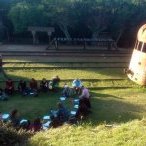English · Español

16 April 2013 | Interviews | 5ta. Fiesta de la Semilla Criolla - Uruguay | Food Sovereignty
Stop Corporate Power
Interview with MP Edgardo Rodriguez: The INIA-Monsanto Deal and the Native Seed Festival
Download: MP3 (1.6 Mb)
The 5th National Native Seed Festival was held last weekend in Tacuarembo, Uruguay. Real World Radio had the chance to interview there Frente Amplio’s MP Edgardo Rodriguez.
Rodriguez, a House member of the ruling party in a department that has traditionally been ruled by conservative parties, said the native seed festival is key for the defense of food sovereignty and for the survival of healthy food production by the Uruguayan family farmers. But he also said there are other key issues where large transnational agribusiness corporations have been advancing with the help of the government.
The lawmaker highlighted some of the progress achieved for the rights of rural workers, such as the creation of a trade union of rural workers, who have been historically exploited and marginalized from the Uruguayan rural landscape.
Rodriguez is one of the House representatives who, last year, insisted on knowing the details and rationale for a deal signed by the National Institute of Agriculture Research (INIA) and transnational corporation Monsanto to improve genetically modified soya seeds. The deal was rejected by environmental organizations like REDES-Friends of the Earth Uruguay and the trade union of rural farmers, such as the National Commission of Rural Promotion.
Rodriguez criticized the deal and said he has been to only one to reject it in Parliament. There have been other measures taken by the Uruguayan governments to promote both soya and forestry agribusiness.
“I feel we are losing this battle. I don’t see the political will needed to confront it. The voices of scrutiny are isolated, while things keep moving forward”.
Rodriguez does not conceal his concern: “I am worried that the Uruguayan institutions are closing deals with transnational corporations that have a lot of economic power. We continue to open the doors for them and they continue to take over”.
Rodriguez believes the alternative is that the State should be in charge of doing research, also through the public bodies of neighboring countries.
“I realize that there are (native) seeds that have many virtues: they adapt to the climate, to the soil. We need to take care of them, preserve them and continue to improve them”, said Rodriguez about the significance of the seed festival that gathered 1,500 people in Valle Eden last weekend.
The event is held every two years and this is the first time it is held in the north of Uruguay, where the distance with the country’s capital, Montevideo, has increased the difficulties for family farmers, partly because large estates are more common in that region as a result of tree and grain monoculture plantations by transnational corporations.
An example of the phitogenetic and food richness of Tacuarembo, Rodriguez highlighted the loss of traditional crops like peanut and local varieties of squash, which were replaced with mostly imported hybdrid types.
During the meeting, representatives of the 250 farmers that comprise the Native Seed Network of Uruguay talked about the problems faced to promote agroecological production, as well as the lobby in public bodies or in Parliament that might threaten the free circulation of seeds.
Rodriguez called the organizations to “push for these issues, to put pressure” to get answers from the political sector.







